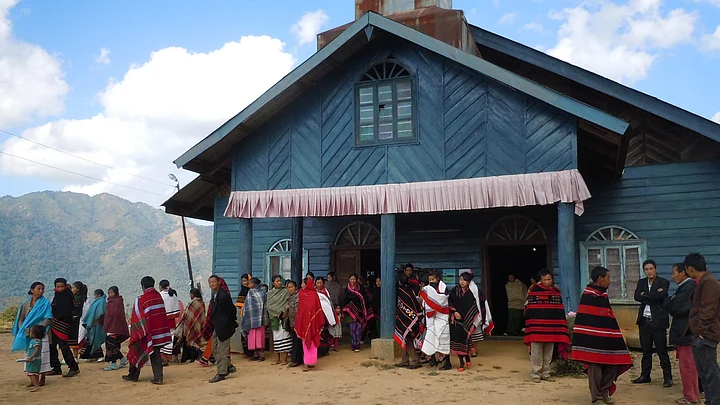The faded blue church of Khongdei Khuman is full of painful memories — dark and deep.
The church, constructed by the Baptist community in this distant village of Manipur in 1953, lies in the shadow of a mountain that separates two districts; Senapati, where it’s located, and Ukhrul, falling on the other side of the range, touching the India-Myanmar border. During church service, it can comfortably sit 700 people.
But exactly 28 years ago, today, the entire Naga people here were herded in “like animals” by Indian security forces and held there — for three months.
It was a military ‘emergency’.
This past week, much media attention has been devoted to the 40th year of the Emergency when the Congress regime snuffed out civil liberties, imprisoned politicians and imposed censorship.
That got over in 1977. But till today, a state of military emergency rules over large tracts of India’s northeast and Kashmir. Looking back, 1975 was nothing compared to what happened — and can still happen — in places like Khongdei Khuman.
On the evening of 10 July 1987, residents were preparing to go to church when dozens of soldiers arrived. They were pursuing fugitive Naga militants, who had shot nine soldiers a day earlier at the Assam Rifles camp in neighbouring Oinam. The rebels escaped with 120 weapons and ammunition.
Under law, the accused can be arrested for trial and conviction. The accusseds’ family, relatives, friends, neighbourhood and nearby town cannot be subjected to torture and indiscriminate killings in the process.
This rule is tossed out of the window when the Armed Forces Special Powers Act (AFSPA) is in force. This gives Indian soldiers unilateral powers to arrest, shoot and kill anyone in “disturbed areas”. Unable to nab the runaway militants, the soldiers, armed with AFSPA, decided to vent their frustration:
They punished Khongdei Khuman, and surrounding villages, for the Oinam incident, leaving 27 people dead and hundreds tortured in a military exercise, called ‘Operation Bluebird’.
During 1987, democratic rights disappeared and district officials and political leaders were barred from entering villages. In violation of a 1983 court order that prevents schools and places of worship to be used as detention centres, soldiers continued to do so. Locals had to cook and sleep inside these churches. To urinate, they had to take permission from sentries to step out.
Graceson Marao was 15 years old when his father, Khuoa Sunai, a village leader, was tortured and died a month later. His corpse was left to decompose. As an afterthought, soldiers handed the corpse back to the family, “disfigured and full of insects” on August 15 — India’s Independence Day.
We could make out it was him only from the shirt he was wearing. We were treated like wild animals.
— Graceson, son of torture victim
Story remained the same in all the affected villages, month after month: If not a church, they were forced to camp in treeless community grounds, under the sun and rain. In Oinam, a woman gave birth to a baby in full public view, when permission was refused to take her home.
Key Ngaole, then 16, does not belong to Khongdei Khuman. He lives in Purul Atongba, three hours walk from here. During that time, soldiers demanded work without pay. The local boys trekked every day, six-hours both ways, to clear forest trails for a month. “We left early morning and came home very late. No tea, no pay,” says Key, now a school teacher.
Men like Key and Graceson were perhaps considered too young to testify, when the Naga People’s Movement for Human Rights (NPMHR), picked up the case. In their record, more than 237 homes were destroyed, 300 men were tortured and women allegedly raped by Assam Rifles men. Its effort to secure compensation for the victims, however, remains unsuccessful 28 years later, a blot on India’s judicial system.
AFSPA makes no mention for compensation when the military burn down villages, or destroy crops, or steal eggs, chicken, firewood and rice from villagers to cook for themselves.
Wherever AFSPA is in force, these things are routine. Any soldier can march into a home and take away personal belongings, with no chance of compensation. Ironically, the state guarantees compensation for victims of natural disaster, or displacement, to its citizens. In a ‘disturbed area’ none of these rights apply.
Human rights organisations have asked for AFSPA victims to be compensated for years, since the Act was enforced in 1958. But even the rights activists collect data mostly along ethnic lines. For example, Naga cases will be picked up by their own, while Meiteis of Imphal valley speak up for gun-violence survivors within their own community. A mainland Assamese has little idea of the offences faced by Bodo tribals in her own state. The impact of AFSPA is widespread, the lack of solidarity among those who oppose it, keeps it going.
Meanwhile, poverty and backwardness rule. Even today, some children of Khongdei Khuman live in nearby Lakamai, three hours walk across the Khapolu Ron valley, just to attend school. The local government school has no proper furniture or teacher.
Graceson, who runs an orphanage in Senapati, 60 km from Imphal, took many years to forgive his father’s killers. He remembers how soldiers stole the choicest wood in the village, kept to renovate their church.
“They just took it away.”
(Maitreyee Handique writes on India’s Northeast and keeps a watch on labour, industrial safety and human rights issues)
